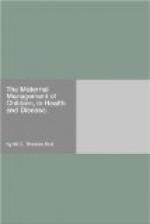Sect. VII. Air and exercise.
In infancy.—The respiration of a pure air is at all times, and under all circumstances, indispensable to the health of the infant. The nursery therefore should be large, well ventilated, in an elevated part of the house, and so situated as to admit a free supply both of air and light. For the same reasons, the room in which the infant sleeps should be large, and the air frequently renewed; for nothing is so prejudicial to its health as sleeping in an impure and heated atmosphere. The practice, therefore, of drawing thick curtains closely round the bed is highly pernicious; they only answer a useful purpose when they defend the infant from any draught of cold air.
The proper time for taking the infant into the open air must, of course, be determined by the season of the year, and the state of the weather. “A delicate infant born late in the autumn will not generally derive advantage from being carried into the open air, in this climate, till the succeeding spring; and if the rooms in which he is kept are large, often changed, and well ventilated, he will not suffer from the confinement, while he will, most probably, escape catarrhal affections, which are so often the consequence of the injudicious exposure of infants to a cold and humid atmosphere."[FN#17] If, however, the child is strong and healthy, no opportunity should be lost of taking it into the open air at stated periods, experience daily proving that it has the most invigorating and vivifying influence upon the system. Regard, however, must always be had to the state of the weather; and to a damp condition of the atmosphere the infant should never be exposed, as it is one of the most powerful exciting causes of consumptive disease. The nurse-maid, too, should not be allowed to loiter and linger about, thus exposing the infant unnecessarily, and for an undue length of time; this is generally the source of all the evils which accrue from taking the babe into the open air.
[FN#17] Sir James Clark on Consumption.
Exercise, also, like air, is essentially important to the health of the infant. Its first exercise, of course, will be in the nurse’s arms. After a month or two, when it begins to sleep less during the day, it will delight to roll and kick about on the sofa: it will thus use its limbs freely; and this, with carrying out into the open air, is all the exercise it requires at this period. By and by, however, the child will make its first attempts to walk. Now it is important that none of the many plans which have been devised to teach a child to walk, should be adopted—the go-cart, leading-strings, etc.; their tendency is mischievous; and flatness of the chest, confined lungs, distorted spine, and deformed legs, are so many evils which often originate in such practices. This is explained by the fact of the bones in infancy being comparatively soft and pliable, and if prematurely subjected by these contrivances to carry the weight of the body, they yield just like an elastic stick bending under a weight, and as a natural consequence become curved and distorted.




